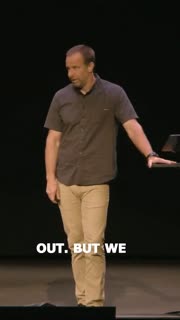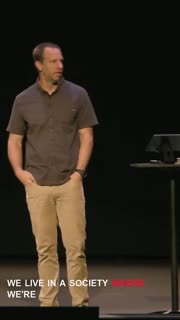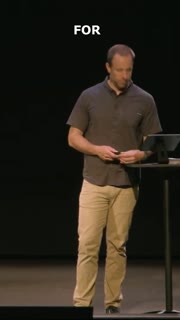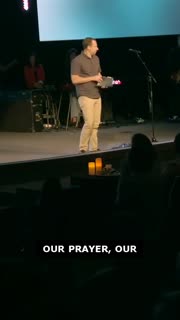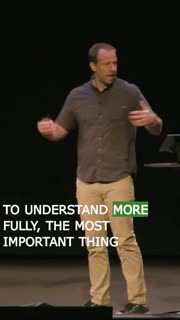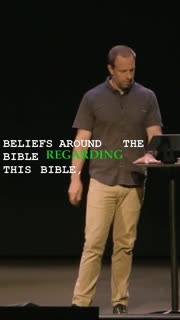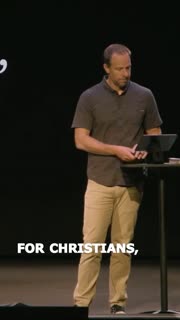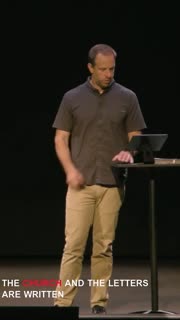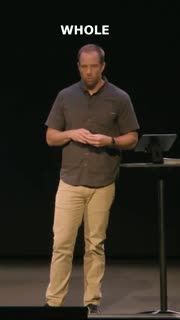Understanding Our Identity and Context in Scripture
Devotional
Sermon Summary
Bible Study Guide
Sermon Clips
### Quotes for outreach
1. "We do not have it all figured out. But we know we are made for life with Jesus, and that's what we're kind of basing our life around. And if you want to take your next step in that, of course we want to make that available for you. That's what our prayer for everybody is, because everybody's got a next step. Whether you're curious about Jesus, or you've been following Jesus for a long time." [23:13] (13 seconds)
2. "We live in a society where we're constantly afraid of being treated as though we are. We live in an image conscious, image aware kind of society that says if you don't look a particular way, if you can't project a certain amount of wealth, or a certain amount of beauty, wherever it is that you go, you might be treated as though you are expendable. And one day we all know, we live in this fear that those things are gonna be taken from us or we won't be able to project all of the things that this little, this world that we live in, Southern California, Orange County kind of world, at some point, we're not gonna be able to project that anymore, and we're gonna wonder, am I expendable, because they don't have those kinds of things anymore?" [58:10] (34 seconds)
3. "For Jesus' people, this is how we're supposed to live, as bridge building kinds of people. And in the first century, what you get is a model for what this meal sharing, or what this kind of community looks like. And people would sit together at a meal. What they would say is this. Whenever they would get together, this is part of the reason why Jesus was so controversial, by the Anytime someone would sit together in a meal, what they're communicating, one to the other, and one to everybody else around them, is that these people are welcome here and they're my equal." [01:00:27] (24 seconds)
4. "Our prayer, our hope, our longing For people who often, which are all of us in here Who rely on things that often let us down Hoping that they would last forever That song and the Bible reminds us That there is only one thing that will last forever That we can rely on This cornerstone of Jesus." [01:07:55] (18 seconds)
### Quotes for members
1. "To understand more fully, the most important thing we would need to do is to connect to the content that is the words that we saw with the context of what actually happened. The work to understand what's actually going on in one half of a text message conversation, and even when you have both halves of the conversation, to understand it fully, you'll need to connect the content with the context." [28:03] (21 seconds)
2. "Beliefs around the Bible regarding this Bible, which Christians call God's Word, vary widely. Some people would say, look, the Bible is sort of moral myths and fairy tales. Yes, there might be some sort of helpful things in there, but you really can't rely on it in the way that people might want to rely on it. Some people might say, this might be you. The Bible is really just kind of an instrument of power, propaganda. There was a guy, probably some emperor, who gathered some people together and said, this is now going to be the thing, and I've stamped my authority on it, and this is how we now know what the Bible is. So it's just a matter of sort of people control." [29:54] (28 seconds)
3. "For Christians, the text is inspired authoritative word of God. You might have heard some of those terms before. But interpreting the scriptures is actually a human work and it is not necessarily infallible. Let me say it this way. You might have heard the expression that the Bible says it, you know, I believe it, that settles it. The problem is that there's something that happens between the belief and the settling, or at least the reading it and the settling of it, or the believing it, which is the interpretation of what it means." [41:15] (29 seconds)
4. "The church and the letters are written for people between times. By that, I mean this. When you look at the Bible, you have the creation of all things, this intended partnership between human beings and God, which God initiates. God then further kind of takes this relationship about how he's going to relate to the world and rescue, or to use a Bible word, redeem the whole world. He's going to do it through one particular family, Abraham and his descendants, this group of people called the Israelites. Then he'll raise up a king, a guy named David, who doesn't exactly do everything perfect. And you look at all of Israel's kings, there's like five that do an okay job. David's the best of them. He doesn't do a great job. There's a couple things he really screws up on. And out of this line of David will come this person, Jesus." [56:06] (38 seconds)
5. "The whole thing is this massive reversal. And the great sort of point of this particular passage, among other things, is that those who are chosen by God end up being rejected by human beings. And the reverse is also, too. Those rejected by human beings, at least in terms of the church, tend to be chosen by God. And what do we do with that? Briefly. The church and the letters are written for people between times." [55:32] (27 seconds)
Ask a question about this sermon
1. "We do not have it all figured out. But we know we are made for life with Jesus, and that's what we're kind of basing our life around. And if you want to take your next step in that, of course we want to make that available for you. That's what our prayer for everybody is, because everybody's got a next step. Whether you're curious about Jesus, or you've been following Jesus for a long time." [23:13] (13 seconds)
2. "We live in a society where we're constantly afraid of being treated as though we are. We live in an image conscious, image aware kind of society that says if you don't look a particular way, if you can't project a certain amount of wealth, or a certain amount of beauty, wherever it is that you go, you might be treated as though you are expendable. And one day we all know, we live in this fear that those things are gonna be taken from us or we won't be able to project all of the things that this little, this world that we live in, Southern California, Orange County kind of world, at some point, we're not gonna be able to project that anymore, and we're gonna wonder, am I expendable, because they don't have those kinds of things anymore?" [58:10] (34 seconds)
3. "For Jesus' people, this is how we're supposed to live, as bridge building kinds of people. And in the first century, what you get is a model for what this meal sharing, or what this kind of community looks like. And people would sit together at a meal. What they would say is this. Whenever they would get together, this is part of the reason why Jesus was so controversial, by the Anytime someone would sit together in a meal, what they're communicating, one to the other, and one to everybody else around them, is that these people are welcome here and they're my equal." [01:00:27] (24 seconds)
4. "Our prayer, our hope, our longing For people who often, which are all of us in here Who rely on things that often let us down Hoping that they would last forever That song and the Bible reminds us That there is only one thing that will last forever That we can rely on This cornerstone of Jesus." [01:07:55] (18 seconds)
### Quotes for members
1. "To understand more fully, the most important thing we would need to do is to connect to the content that is the words that we saw with the context of what actually happened. The work to understand what's actually going on in one half of a text message conversation, and even when you have both halves of the conversation, to understand it fully, you'll need to connect the content with the context." [28:03] (21 seconds)
2. "Beliefs around the Bible regarding this Bible, which Christians call God's Word, vary widely. Some people would say, look, the Bible is sort of moral myths and fairy tales. Yes, there might be some sort of helpful things in there, but you really can't rely on it in the way that people might want to rely on it. Some people might say, this might be you. The Bible is really just kind of an instrument of power, propaganda. There was a guy, probably some emperor, who gathered some people together and said, this is now going to be the thing, and I've stamped my authority on it, and this is how we now know what the Bible is. So it's just a matter of sort of people control." [29:54] (28 seconds)
3. "For Christians, the text is inspired authoritative word of God. You might have heard some of those terms before. But interpreting the scriptures is actually a human work and it is not necessarily infallible. Let me say it this way. You might have heard the expression that the Bible says it, you know, I believe it, that settles it. The problem is that there's something that happens between the belief and the settling, or at least the reading it and the settling of it, or the believing it, which is the interpretation of what it means." [41:15] (29 seconds)
4. "The church and the letters are written for people between times. By that, I mean this. When you look at the Bible, you have the creation of all things, this intended partnership between human beings and God, which God initiates. God then further kind of takes this relationship about how he's going to relate to the world and rescue, or to use a Bible word, redeem the whole world. He's going to do it through one particular family, Abraham and his descendants, this group of people called the Israelites. Then he'll raise up a king, a guy named David, who doesn't exactly do everything perfect. And you look at all of Israel's kings, there's like five that do an okay job. David's the best of them. He doesn't do a great job. There's a couple things he really screws up on. And out of this line of David will come this person, Jesus." [56:06] (38 seconds)
5. "The whole thing is this massive reversal. And the great sort of point of this particular passage, among other things, is that those who are chosen by God end up being rejected by human beings. And the reverse is also, too. Those rejected by human beings, at least in terms of the church, tend to be chosen by God. And what do we do with that? Briefly. The church and the letters are written for people between times." [55:32] (27 seconds)
